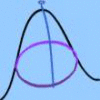Skip over navigation
This is one of a series of problems designed to develop learners' team working skills. Other tasks in the series can be found by going to this article.

Or search by topic
Number and algebra
Geometry and measure
Probability and statistics
Working mathematically
Advanced mathematics
For younger learners
The Solid
Age 11 to 16
Challenge Level 





- Problem
- Teachers' Resources
This is one of a series of problems designed to develop learners' team working skills. Other tasks in the series can be found by going to this article.
What are you aiming to do?
For the task:
The team has to make the solid described by sharing the information on their cards and without showing each team member's information to anyone else.As a team:
- Allowing everyone to contribute
- Listening
- Asking questions and finding out what others think
- Sharing knowledge and reasoning
- Reflecting and making use of what has been said
- Coming to a consensus
Getting started
You will be working in a
team of four. Ensure that you have plenty of cubes. Their colour
does not matter but it may be less distracting to have all the
cubes of the same colour. You cannot use paper or pencil to help
you because you need to listen to what others have to say.
Discuss how you will work
together and share your ideas.
Put the 4 cards
face down in the centre of the table.
Tackling the problem
Each member of the team takes a card from the pile in turn (one card each) without the others seeing it.Rules
- Team members cannot show their cards to anyone else on the team.
- A team member can describe what is on their card.
- Team members can ask questions to help them make sense of what is on their card, or on someone else's card.
- The task is complete when everyone agrees that the solid they have made matches everything that is on their cards.
- Check that no one reveals their card or writes anything down.
- Identify points where team members share knowledge and reasoning and listen to each other.
- Identify points where team members make decisions together.
- Note whether all members of the team are involved.
You may also like
Geometry and Gravity 1
This article (the first of two) contains ideas for investigations. Space-time, the curvature of space and topology are introduced with some fascinating problems to explore.

